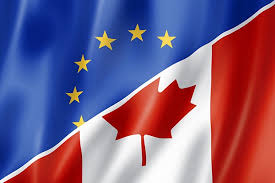Published: Wed, 01 March 2017
Share this

The ambitious EU-Canada trade agreement (CETA), will be provisionally applied across the EU from April. It will bring prosperity, strengthen European and Canadian economic ties and reinforce our position in a changing and increasingly globalised world.
The predicted economic benefits of CETA for Europe and Ireland are undeniable: an annual €12 billion GDP boost for the EU, with an estimated €1.2 billion boost in exports for Ireland. It is a fact that Ireland has an export-orientated economy. 80 percent of everything we produce is exported and tens of thousands of Irish jobs depend on trade and agreements. Ireland is also Canada’s fifth largest investment recipient. Additionally, CETA will create better investment opportunities, increase competitiveness, and encourage innovation.
CETA is also hugely important for its geostrategic impact. Over one-fifth of our exports go to the US. Yet, we cannot be certain how President Donald Trump’s policies will affect Irish businesses. His policies are extremely protectionist as evidenced by the death knell he sounded for the Trans-Pacific Partnership, changes to the rules of federal regulation and possible tax cuts. The latter would, without a doubt, impact on Ireland’s exports and foreign direct investment.
The potential negative implications of Brexit on Ireland are well documented, but it is worth restating that we cannot ignore the severity of the impact Brexit will have on this country. Meanwhile, new world powers such as the BRIC countries of Brazil, Russia, India and China, continue to rise while turbulence persists in the Middle East, Turkey and elsewhere. The EU needs to take such factors into account, and secure reliable trading relationships in order to preserve our economic competitiveness and our status as the world’s largest economy.
I am not an absolutist. Although free trade brings peace and prosperity, I do not deny that effects of rapid technological development have taken its toll on manufacturing jobs, which people then link to globalisation. If we exclude ourselves from global trading opportunities, are we “standing up for Ireland’s rights or sovereignty” as claimed by some opposed to CETA. I would not be so sure. We should strive to reach a middle ground, to shape globalisation, rather than be shaped by it.
Ireland has seen how much trade can help to secure and create jobs, and CETA will allow us to grow even more. Every €1 billion in exports supports 14,000 European jobs. It is a fact that the EU-South Korea trade deal resulted in 210,000 new jobs in Europe. Perhaps certain sectors may not benefit as significantly as others may, but this does not mean that any sector will be sacrificed for another.
Small and medium sized enterprises (SMEs) will benefit most. Removing the barriers to trade and providing clear rules for SMEs will create a more competitive trade and export environment. 99.7pc of Irish businesses are SMEs and they need our support to continue to grow and create more jobs.
The basis of CETA is threefold: improving market access and eliminating trade barriers, ensuring cooperation between the EU and Canadian regulators, and establishing international trade rules. After 7 years of negotiations, with the full inclusion of various stakeholders including trade unions, NGOs, government officials and more, a very advanced, extensive trade agreement was achieved with CETA.
Certain issues such as transparency, agriculture, and the old investor to state dispute-settlement (ISDS) system ignited much debate, which is welcome. On the question of transparency, the European Commission negotiates trade agreements on behalf of the EU, providing regular public updates. The European Parliament and Member States have their say along the way as well as final ratification or rejection powers. Therefore, the process of negotiating involves all of the EU institutions, governmental and non-governmental actors and is fully democratic. After seven years of negotiations and consultations with stakeholders, some still try to mislead the public and refer to CETA as a “secret deal” – if that is the case, it must be the worst kept secret in the world!
Secondly, the EU has very strict laws on hormone-fed beef and GMOs which will not change under CETA, though critics continue to pedal misinformation to the contrary. While trade arrangements can be a cause of concern for sensitive sectors like agriculture, they offer huge opportunities too. Exports are essential for the Irish agricultural sector. Currently, EU food and agricultural exports face between 10-20pc tariffs with Canada. CETA will eliminate almost 92pc of tariffs. However, certain sensitive sectors, such as beef and pork, will remain under limited quotas as agreed. Furthermore, CETA will not open up the market for poultry and eggs in the EU or Canada.
Thirdly, foreign direct investment is guaranteed by over 3,200 bilateral investment agreements worldwide, providing companies a certain level of investment protection. EU Members States are part of 1,400 of these agreements. Eight bilateral agreements exist between Canada and the EU, which will be replaced by a single set of clear rules under CETA. An extensive EU-wide consultation with the public and stakeholders is ongoing on this very issue and will feed into the creation of a new system – the Multilateral Investment Court. It ensure protection for investments while enshrining the right of governments to regulate in the public interest.
CETA is what Europe and Ireland needs. It is a massive opportunity to boost Irish trade and create thousands of jobs.